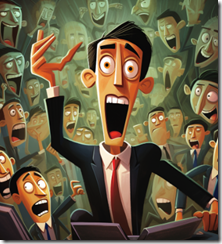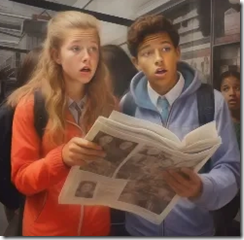The Murdoch Effect: Outstanding Information 24×7
October 2, 2023
 Note: This essay is the work of a real and still-alive dinobaby. No smart software involved, just a dumb humanoid.
Note: This essay is the work of a real and still-alive dinobaby. No smart software involved, just a dumb humanoid.
Rupert Murdoch is finally retiring and leaving his propaganda empire to his son Lachlan, who may or may not be even more right-wing than dear old dad. While other outlets ponder what this means for the future of News Corp, Gizmodo examines “All the Ways Rupert Murdoch Left his Grubby Fingerprints on Tech.” Writer Kyle Barr writes:
“You don’t become the biggest name in worldwide media without also becoming something of a major influence on tech. With his direct influence now waning, we can do a bit of an obituary on the mogul’s efforts to influence the world of tech, and how both his direct and unintended efforts have contributed to the shape of our current digital landscape. News Corp wanted to be the biggest name in digital media, and at every step it failed to compete with other big names, leaving it to rely on the bread and butter of its conservative news apparatus. Murdoch’s billions were involved in consolidating the world’s online media experience. His no-holds-barred operating philosophy would end up violating people’s privacy and setting us up for the state of current social media and content streaming. All the while, News Corp’s entities would struggle to find an actual, legitimate foothold in the digital frontier. Instead, Fox News and other Murdoch-owned brands facilitated a new media environment where disinformation ruled the day and truth was laid aside for conservative grievance.”
The write-up shares 11 indelible blotches Murdoch made on the tech landscape in slideshow form. A few key moments include buying up MySpace, thereby clearing the way for Facebook and its countless consequences; helping Mr. Trump rise to power; and buying and forwarding the decimation of one of my favorite childhood institutions, National Geographic. A couple noteworthy fumbles include investment in the fraudulent Theranos and the Dominion Lawsuit against Fox News. See the article for more of Barr’s examples. Now, we wonder, what marks will the junior Murdoch make?
Cynthia Murrell, October 2, 2023
Just TikToking Along, Folks
September 21, 2023
Beleaguered in the US, its largest market, TikTok is ready to embrace new options in its Southeast Asian advance. CNBC reports, “TikTok Shop Strikes ‘Buy Now, Pay Later’ Partnership in Malaysia As Part of E-Commerce Push.” Writer Cheila Chiang reports:
“The partnership comes as TikTok looks to markets outside of the U.S. for growth. While the U.S. is the company’s largest market, TikTok faces headwinds there after Montana became the first state to ban the app. The app has also been banned in India. In recent months, TikTok Shop has been aggressively expanding into e-commerce in Southeast Asia, competing against existing players like Sea’s Shopee and Alibaba’s Lazada. TikTok’s CEO previously said the company will pour ‘billions of dollars’ into Southeast Asia over the next few years. As of April, TikTok said it has more than 325 million monthly users in Southeast Asia. In June, the company said it would invest $12.2 million to help over 120,000 small and medium-sized businesses sell online. The investment consists of cash grants, digital skills training and advertising credits for these businesses.”
What a great idea for the teenagers who are the largest cohort of TikTok users. Do they fully grasp the pay later concept and its long-term effects? Sure, no problem. Kids love to work at part time jobs, right? As long as major corporations get to expand as desired, that is apparently all that matters.
Cynthia Murrell, September 21, 2023
Disney Alleges Some Cast Are Not Decorous
September 11, 2023
 Note: This essay is the work of a real and still-alive dinobaby. No smart software involved, just a dumb humanoid.
Note: This essay is the work of a real and still-alive dinobaby. No smart software involved, just a dumb humanoid.
I spotted a story which may not be 100 percent on the money. If I were not 78, I would scour online resources to determine the veracity of “Furious Disney Bosses Call in Investigators after Disgruntled Employee Shares Shocking Clips of Beloved Characters.” For the purposes of this brief essay, let’s assume that the estimable Sun is writing the Truth According to Walt, who is allegedly frozen in a cryogenic chamber with machine generated images of Minnie Mouse doing interesting things at Disneyland.
A mutant character finds its way to a football game in Orlando. The egg shaped mascot shouts, “Everybody now. Twerk twerk twerk.” The Orlando Pride faithful takes off their Orlando Solar Bear’s hats and puts on official Mickey Mouse ears. Twerk twerk twerk. Walt and Roy Disney look alikes joined the fund. Thanks, MidJourney. No red alerts on my prompt. Too bad reversing the gradient descent is going to be difficult. Twerk twerk twerk.
The write up reports as “real news”:
Disney chiefs are furious over leaked videos showing theme park characters twerking. Dancing staff are also seen provocatively removing their costumes in behind-the-scenes footage.
The well paid and really content “cast” members dancing in a suggestive manner and/or removing their clothes? Come on, Sunny. Disneyland is super clean. The trash is removed and carried away via underground service tunnels. I have heard that interesting activities have taken place in those service tunnels. But my source with a retired Orlando law enforcement officer who was not a fan of the Disney outfit. I assumed he had to watch Snow White too many times while raising his two children. Hi ho, hi ho, it’s off to jail we go or some similar refrain is lodged in my brain, and I saw Snow White only one time. That was sufficient, right, Dopey?
The write up adds:
They [the management team presiding over the smoking crater of Disney earnings] have called in a team of investigators in a bid to root out those involved in filming the footage and those posting it. A source said: “It looks silly, but for Disney protecting the integrity of those characters is absolutely paramount. “They’ve asked top investigators to shut down the feed and try to identify those responsible, who are in breach of their employment contracts. “The last thing Disney wants is decapitated Mickey and Minnie heads going viral online and, even worse, anything that looks at all risqué or adult.
I am not sure about the “last thing” assertion. I learned while preparing for an upcoming lecture about smart software generating interesting Disney clips for those who like their anime spicy. Smart software is merely a technological enabler. It takes a human to merge a Disney character with the mentality of a ComicCon Furry meet up.
And what about Disney’s streaming tactics? Charter Spectrum and some sports fans who leave ESPN on 24×7 are not happy with the Magic Kingdom.
Okay, cast, more training will be required. For those curious about the beloved characters antics, check out TikTok.
Stephen E Arnold, September 11, 2023
YouTube Content: Are There Dark Rabbit Holes in Which Evil Lurks? Come On Now!
September 1, 2023
 Note: This essay is the work of a real and still-alive dinobaby. No smart software involved, just a dumb humanoid.
Note: This essay is the work of a real and still-alive dinobaby. No smart software involved, just a dumb humanoid.
Google has become a cultural touchstone. The most recent evidence is a bit of moral outrage in Popular Science. Now the venerable magazine is PopSci.com, and the Google has irritated the technology explaining staff. Navigate to “YouTube’s Extremist Rabbit Holes Are Deep But Narrow.”
Google, your algorithm is creating rabbit holes. Yes, that is a technical term,” says the PopSci technology expert. Thanks for a C+ image MidJourney.
The write up asserts:
… exposure to extremist and antagonistic content was largely focused on a much smaller subset of already predisposed users. Still, the team argues the platform “continues to play a key role in facilitating exposure to content from alternative and extremist channels among dedicated audiences.” Not only that, but engagement with this content still results in advertising profits.
I think the link with popular science is the “algorithm.” But the write up seems to be more a see-Google-is-bad essay. Science? No. Popular? Maybe?
The essay concludes with this statement:
While continued work on YouTube’s recommendation system is vital and admirable, the study’s researchers echoed that, “even low levels of algorithmic amplification can have damaging consequences when extrapolated over YouTube’s vast user base and across time.” Approximately 247 million Americans regularly use the platform, according to recent reports. YouTube representatives did not respond to PopSci at the time of writing.
I find the use of the word “admirable” interesting. Also, I like the assertion that algorithms can do damage. I recall seeing a report that explained social media is good and another study pitching the idea that bad digital content does not have a big impact. Sure, I believe these studies, just not too much.
Google has a number of buns in the oven. The firm’s approach to YouTube appears to be “emulate Elon.” Content moderation will be something with a lower priority than keeping tabs on Googlers who don’t come to the office or do much Google work. My suggestion for Popular Science is to do a bit more science, and a little less quasi-MBA type writing.
Stephen E Arnold, September 1, 2023
Software Marches On: Should Actors Be Worried?
August 25, 2023
 Note: This essay is the work of a real and still-alive dinobaby. No smart software involved, just a dumb humanoid.
Note: This essay is the work of a real and still-alive dinobaby. No smart software involved, just a dumb humanoid.
“How AI Is Bringing Film Stars Back from the Dead” is going to raise hackles of some professionals in Hollywood. I wonder how many people alive today remember James Dean. Car enthusiasts may know about his driving skills, but not too much about his dramaturgical abilities. I must confess that I know zippo about Jimmy other than he was a driver prone to miscalculations.
An angry human actor — recycled and improved by smart software — snarls, “I didn’t go to acting school to be replaced by software. I have a craft, and it deserves respect.” MidJourney, I only had to describe what I wanted one time. Keep on improving or recursing or whatever it is you do.
The Beeb reports:
The digital cloning of Dean also represents a significant shift in what is possible. Not only will his AI avatar be able to play a flat-screen role in Back to Eden and a series of subsequent films, but also to engage with audiences in interactive platforms including augmented reality, virtual reality and gaming. The technology goes far beyond passive digital reconstruction or deepfake technology that overlays one person’s face over someone else’s body. It raises the prospect of actors – or anyone else for that matter – achieving a kind of immortality that would have been otherwise impossible, with careers that go on long after their lives have ended.
The write up does not reference the IBM study suggesting that 40 percent of workers will require reskilling. I am not sure that a reskilled actor will be able to do. I polled my team and it came up with some Hollywood possibilities:
- Become an AI adept with a mastery of python, Java, and C. Code software replacing studio executives with a product called DorkMBA
- Channel the anger into a co-ed game of baseball and discuss enthusiastically with the umpire corrective lenses
- Start an anger management podcast and, like a certain Stanford professor, admit the indiscretions of one’s childhood
- Use MidJourney and ChatGPT to write a manga for Amazon
- Become a street person.
I am not sure these ideas will be acceptable to those annoyed by the BBC write up. I want to point out that smart software can do some interesting things. My hunch is that software can do endless versions of classic hits with old-time stars quickly and more economically than humanoid involved professionals.
I am not Bogarting you.
Stephen E Arnold, August 25, 2023
Young People Are Getting News from Sources I Do Not Find Helpful. Sigh.
July 28, 2023
![Vea4_thumb_thumb_thumb_thumb_thumb_t[1] Vea4_thumb_thumb_thumb_thumb_thumb_t[1]](http://arnoldit.com/wordpress/wp-content/uploads/2023/07/Vea4_thumb_thumb_thumb_thumb_thumb_t1_thumb-47.gif) Note: This essay is the work of a real and still-alive dinobaby. No smart software involved, just a dumb humanoid.
Note: This essay is the work of a real and still-alive dinobaby. No smart software involved, just a dumb humanoid.
“TikTok Is the Most Popular News Source for 12 to 15-Year-Olds, Says Ofcom” presents some interesting data. First, however, let’s answer the question, “What’s an Ofcom?” It is a UK government agency regulates communication in the UK. From mobile to mail, Ofcom is there. Like most government entities, it does surveys.
Now what did the Ofcom research discover? Here are three items:
“You mean people used to hold this grimy paper thing and actually look at it to get information?” asks one young person. The other says, “Yes, I think it is called a maga-bean or maga-zeen or maga-been, something like that.” Thanks for this wonderful depiction of bafflement, MidJourney.
- In the UK, those 12 to 15 get their news from TikTok.
- The second most popular source of news is the Zuckbook’s Instagram.
- Those aged from 16 to 24 are mired in the past, relying on social media and mobile phones.
Interesting, but I was surprised that a traditional printed newspaper did not offer more information about the impact of this potentially significant trend on newspapers, printed books, and printed magazines.
Assuming the data are correct, as those 12 to 15 age, their behavior patterns may suggest that today’s dark days for traditional media were a bright, sunny afternoon.
Stephen E Arnold, July 28, 2023
TikTok: Ever Innovative and Classy Too
July 21, 2023
![Vea4_thumb_thumb_thumb_thumb_thumb_t[1] Vea4_thumb_thumb_thumb_thumb_thumb_t[1]](http://arnoldit.com/wordpress/wp-content/uploads/2023/07/Vea4_thumb_thumb_thumb_thumb_thumb_t1_thumb-28.gif) Note: This essay is the work of a real and still-alive dinobaby. No smart software involved, just a dumb humanoid.
Note: This essay is the work of a real and still-alive dinobaby. No smart software involved, just a dumb humanoid.
I have no idea if the write up is accurate. Without doing any deep thinking or even cursory research, the story seems so appropriate for our media environment. (I almost typed medio ambiente. Yikes. The dinobaby is really old on this hot Friday afternoon.)
“Of course, I share money from videos of destitute people crying in inclement weather. It is the least I can do. I am working on a feature film now,” says the brilliant innovator who has his finger on the pulse of the TikTok viewer. The image of this paragon popped out of the MidJourney microwave quickly.
Here’s the title: “People on TikTok Are Paying Elderly Women to Sit in Stagnant Mud for Hours and Cry.” Yes, that’s the story. The write up states as actual factual:
Over hours, sympathetic viewers send “coins” and gifts that can be exchanged for cash, amounting to several hundred dollars per stream, says Sultan Akhyar, the man credited with inventing the trend. Emojis of gifts, roses, and well-wishes float up gently from the bottom of the live feed. The viral phenomenon known as mandi lumpur, or “mud baths,” gained notoriety in January when several livestreams were posted from Setanggor village …
Three quick observations:
- The classy vehicle for this entertainment is TikTok.
- Money is involved and shared immediately. Yep, immediately.
- Live video, the entertainment of the here-and-now.
I am waiting for the next innovation that takes crying in the mud to another level.
Stephen E Arnold, July 21, 2023
TikTok Interface: Ignoring the Big Questions
July 10, 2023
![Vea4_thumb_thumb_thumb_thumb_thumb_t[1] Vea4_thumb_thumb_thumb_thumb_thumb_t[1]](http://arnoldit.com/wordpress/wp-content/uploads/2023/07/Vea4_thumb_thumb_thumb_thumb_thumb_t1_thumb-12.gif) Note: This essay is the work of a real and still-alive dinobaby. No smart software involved, just a dumb humanoid.
Note: This essay is the work of a real and still-alive dinobaby. No smart software involved, just a dumb humanoid.
I read “TikTok Is Confusing by Design.” That’s correct. But the write up does not focus on the big questions. However, the article tiptoes up to the $64 question and then goes for a mocha latte. Very modern.
A number of articles ignore flashing red lights. William James called this “a certain blindness.” Thanks, MidJourney to a wonderful illustration crafted from who knows what.
Note these snippets from the essay:
- a controlled experience that’s optimized to know or decide what we want and then deliver it to us.
- You don’t get to choose from a list of related content, nor is there any real order to whatever you’ll get.
- It’s a comfortable space to be in when you don’t have to make choices.
- TikTok’s approach has become the new standard. Part of that standard is aggressively pushing content at you that the app has decided you want to see.
So what are the big questions? The article shoves them to the end of the essay. Will people persist and ponder them? Don’t big questions warrant a more compelling presentation?
Here’s a big question:
“Who gets to control what you are seeing of reality?”
The answer is obvious in the case of TikTok: Entities in some way linked to the Chinese government.
And what about online services working overtime to duplicate the TikTok model? Who is in control of the content, its context, and its concepts?
The answer is, “An outfit that will have unprecedented amount of influence over users’ thoughts and actions.” If those users — digital addicts, perhaps — are not able to recognize manipulation or simply choose to say, “Hey, no big deal”, TikTok-type content systems will be driving folks down the Information Highway. Riders may have no choice. Riders may have to pay to driven around. Riders may not be in control of their behaviors, ideas, and time.
I like the idea of TikTok as an interface. I don’t like touching on big questions and then sidestepping them.
Net net: I won’t pay for access to Vox.
Stephen E Arnold, July 10, 2023
Learning Means Effort, Attention, and Discipline. No, We Have AI, or AI Has Us
July 4, 2023
![Vea4_thumb_thumb_thumb_thumb_thumb_t[1] Vea4_thumb_thumb_thumb_thumb_thumb_t[1]](http://arnoldit.com/wordpress/wp-content/uploads/2023/07/Vea4_thumb_thumb_thumb_thumb_thumb_t1_thumb-8.gif) Note: This essay is the work of a real and still-alive dinobaby. No smart software involved, just a dumb humanoid.
Note: This essay is the work of a real and still-alive dinobaby. No smart software involved, just a dumb humanoid.
My newsfeed of headlines produced a three-year young essay titled “How to Learn Better in the Digital Age.” The date on the document is November 2020. (Have you noticed how rare a specific date on a document appears?)
MidJourney provided this illustration of me doing math homework with both hands in 1952. I was fatter and definitely uglier than the representation in the picture. I want to point out: [a] no mobile phone, [b] no calculator, [c] no radio or TV, [d] no computer, and [e] no mathy father breathing down my neck. (He was busy handling the finances of a weapons manufacturer which dabbled in metal coat hangers.) Was homework hard? Nope, just part of the routine in Campinas, Brazil, and the thrilling Calvert Course.
The write up contains a simile which does not speak to me; namely, the functioning of the human brain is emulated to some degree in smart software. I am not in that dog fight. I don’t care because I am a dinobaby.
For me the important statement in the essay, in my opinion, is this one:
… we need to engage with what we encounter if we wish to absorb it long term. In a smartphone-driven society, real engagement, beyond the share or like or retweet, got fundamentally difficult – or, put another way, not engaging got fundamentally easier. Passive browsing is addictive: the whole information supply chain is optimized for time spent in-app, not for retention and proactivity.
I marvel at the examples of a failure to learn. United Airlines strands people. The CEO has a fix: Take a private jet. Clerks in convenience stores cannot make change even when the cash register displays the amount to return to the customer. Yeah, figuring out pennies, dimes, and quarters is a tough one. New and expensive autos near where I live sit on the side of the road awaiting a tow truck from the Land Rover- or Maserati-type dealer. The local hospital has been unable to verify appointments and allegedly find some X-ray images eight weeks after a cyber attack on an insecure system. Hip, HIPPA hooray, Hip HIPPA hooray. I have a basket of other examples, and I would wager $1.00US you may have one or two to contribute. But why? The impact of poor thinking, reading, math, and writing skills are abundant.
Observations:
- AI will take over routine functions because humans are less intelligent and diligent than when I was a fat, slow learning student. AI is fast and good enough.
- People today will not be able to identify or find information to validate or invalidate an output from a smart system; therefore, those who are intellectually elite will have their hands on machines that direct behavior, money, and power.
- Institutions — staffed by employees who look forward to a coffee break more than working hard — will gladly license smart workflow revolution.
Exciting times coming. I am delighted I a dinobaby and not a third-grade student juggling a mobile, an Xbox, an iPad, and a new M2 Air. I was okay with a paper and pencil. I just wanted to finish my homework and get the best grade I could.
Stephen E Arnold, July
Old School Book Reviewers, BookTok Is Eating Your Lunch Now
June 7, 2023
![Vea4_thumb_thumb_thumb_thumb_thumb_t[1] Vea4_thumb_thumb_thumb_thumb_thumb_t[1]](http://arnoldit.com/wordpress/wp-content/uploads/2023/06/Vea4_thumb_thumb_thumb_thumb_thumb_t1_thumb-7.gif) Note: This essay is the work of a real and still-alive dinobaby. No smart software involved, just a dumb humanoid.
Note: This essay is the work of a real and still-alive dinobaby. No smart software involved, just a dumb humanoid.
Perhaps to counter recent aspersions on its character, TikTok seems eager to transfer prestige from one of its popular forums to itself. Mashable reports, “TikTok Is Launching its Own Book Awards.” The BookTok community has grown so influential it apparently boosts book sales and inspires TV and movie producers. Writer Meera Navlakha reports:
“TikTok knows the power of this community, and is expanding on it. First, a TikTok Book Club was launched on the platform in July 2022; a partnership with Penguin Random House followed in September. Now, the app is officially launching the TikTok Book Awards: a first-of-its-kind celebration of the BookTok community, specifically in the UK and Ireland. The 2023 TikTok Book Awards will honour favourite authors, books, and creators across nine categories. These range ‘Creator of the Year’ to ‘Best BookTok Revival’ to ‘Best Book I Wish I Could Read Again For The First Time’. Those within the BookTok ecosystem, including creators and fans, will help curate the nominees, using the hashtag #TikTokBookAwards. The long-list will then be judged by experts, including author Candice Brathwaite, creators Coco and Ben, and Trâm-Anh Doan, the head of social media at Bloomsbury Publishing. Finally, the TikTok community within the UK and Ireland will vote on the short-list in July, through an in-app hub.”
What an efficient plan. This single, geographically limited initiative may not be enough to outweigh concerns about TikTok’s security. But if the platform can appropriate more of its communities’ deliberations, perhaps it can gain the prestige of a digital newspaper of record. All with nearly no effort on its part.
Cynthia Murrell, June 7, 2023









